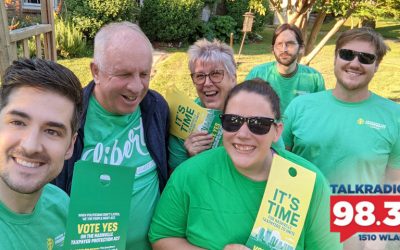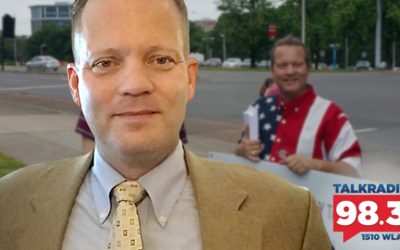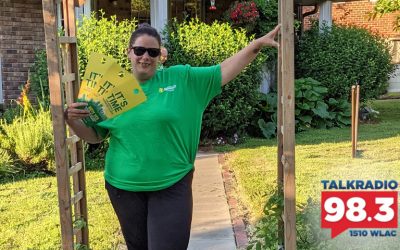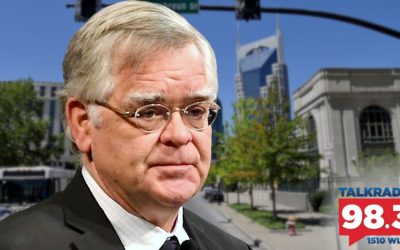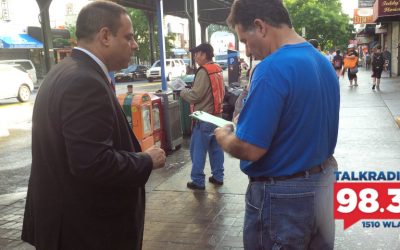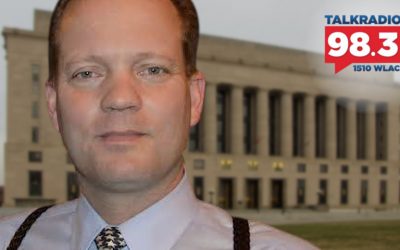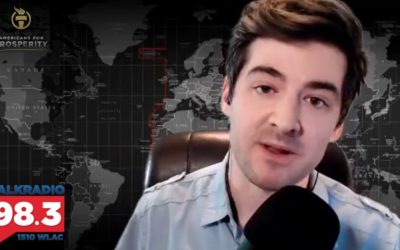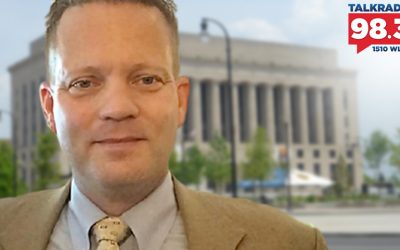Tuesday morning on the Tennessee Star Report, host Michael Patrick Leahy welcomed Grassroots Director for Americans for Prosperity-Tennessee Grant Henry in studio to discuss the recent ruling on 4 Good Government referendum.
Attorney Jim Roberts on Pending Litigation with Metro Legal and Nashville Business Coaltion
Friday morning on the Tennessee Star Report, host Michael Patrick Leahy welcomed Nashville Taxpayer Protection Act Attorney Jim Roberts to the newsmakers line to discuss how the referendum continues to have a place on the ballot despite the Metro government’s fear-mongering.
American’s for Prosperity Tennessee Grassroots Director Grant Henry Goes a Door Knocking to Campaign for the Nashville Taxpayer Protection Act
Thursday morning on the Tennessee Star Report, host Michael Patrick Leahy welcomed AMF’s Grant Henry in studio to expand on the Nashville Taxpayer Protection Act and the start of grassroots door knocking.
Crom Carmichael Compares Mayor John Cooper and Former Governor Don Sundquist on Tax Reform Discussions
Friday morning on the Tennessee Star Report, host Michael Patrick Leahy welcomed the original all-star panelist Crom Carmichael in studio to discuss the false claims of impending doom made by Mayor John Cooper to dissuade people from voting on the tax referendum.
Nashville Taxpayer Protection Act Attorney Jim Roberts Is Still Winning as Metro Continues Disinformation Campaign
Friday morning on the Tennessee Star Report, host Michael Patrick Leahy welcomed Nashville Taxpayer Protection Act Attorney Jim Roberts to the newsmakers line to describe the many ways in which they are still winning the fight against the Metro government and dishonest information.
American’s for Prosperity-Tennessee Grant Henry Calls on Conservatives to Come Out and Voluneteer at Grassrootsnashville.com
Friday morning on the Tennessee Star Report, host Michael Patrick Leahy welcomed AFP’s Grassroots Director Grant Henry to the newsmakers line to talk about their campaign at Grassrootsnashville.com urging conservatives to volunteer and get out the vote on June 27th to stop the tax increase in Davidson County.
As the Election Process Moves Forward, Jim Roberts Confident Referendum on July 27 Ballot
Friday morning on the Tennessee Star Report, host Michael Patrick Leahy welcomed Nashville Taxpayer Protection Act Attorney Jim Roberts to the newsmakers line to talk about getting on the July 27th ballot and upcoming Chancery Court trial.
Nashville Taxpayer Protection Act: Attorney Jim Roberts Continues to Win the Fight Against Metro Legal and Faux Citizen Action Groups
Friday morning on the Tennessee Star Report, host Michael Patrick Leahy welcomed the man behind the Nashville Taxpayer Protection Act attorney Jim Roberts to give updates to the referendum he expects to see put on the July 27th ballot despite fake grassroots activism.
Attorney Jim Roberts Explains Metro Legal and Nashville Business Coalition’s Continued Efforts of Voter Suppression
Friday morning on the Tennessee Star Report, host Michael Patrick Leahy welcomed attorney Jim Roberts of 4goodgovernment.com to the newsmakers with the good news of Davidson County Election Commission’s vote to put the referendum on the July ballot.
Attorney Jim Roberts Talks Davidson County Election Commission Upcoming Vote and Metro Legal Impending Infinite Litigation
Friday morning on the Tennessee Star Report, host Michael Patrick Leahy welcomed Nashville Taxpayer Protection Act attorney Jim Roberts to the newsmakers line to give updates to the status of Davidson County Election Commission’s vote and Metro legal’s imminent litigation.
Nashville Taxpayer Protection Attorney Jim Roberts Expects Metro Legal to Sue Election Commission and Petition Signers to Stop Referendum
Friday morning on the Tennessee Star Report, host Michael Patrick Leahy welcomed Nashville Taxpayer Protection Act Attorney Jim Roberts to the newsmakers line to give updates on the referendum reaching the ballot and the potential lawsuit filed by Metro Legal against Election Commission and petitioners.
Nashville Taxpayer Protection Act: Attorney Jim Roberts Updates on Verified Petition Signatures and Election Commission Stall Tactics
Friday morning on the Tennessee Star Report, host Michael Patrick Leahy welcomed Nashville Taxpayer Protection Act’s Attorney Jim Roberts to the newsmakers line to discuss the Election Commission’s official verification satisfactory petition signatures to get the referendum on the ballot and the calculated deception of Mayor Cooper.
Americans for Prosperity’s Grassroots Engagement Director Grant Henry Explains the ‘Tennessee Truth in Taxation’ Bill
Monday morning on the Tennessee Star Report, host Michael Patrick Leahy welcomed Grant Henry the Grassroots Engagement Director for Americans for Prosperity to the newsmakers line to talk about the Truth in Taxation bill that would provide transparency to taxpayers and prevent reckless spending at the local government level.
Nashville Taxpayer Protection Act Attorney Jim Roberts on Metro Legals Attempt at Adverse Outside Council and Ominous Group Harassment of Petition Signers
Friday morning on the Tennessee Star Report, host Michael Patrick Leahy welcomed Nashville Taxpayer Protection Act’s attorney Jim Roberts to the newsmakers line to update listeners on the dirty tricks and schemes crafted by Metro legal to stop the referendum from appearing on the ballot and exposes a fake group harassing petitioners.
Nashville Taxpayer Protection Act: Attorney Jim Roberts Talks Metro Legal’s Creation of Suppression and Fear as Referendum Seeks Ballot
Friday morning on the Tennessee Star Report, host Michael Patrick Leahy welcomed Nashville Taxpayer Protection Act Attorney Jim Roberts to the newsmakers line to give updates on where he stands in the fight against Metro Legal to get the proper number or petitions solidified to move forward with his referendum.
Nashville Taxpayer Protection Act: Attorney Jim Roberts Comes Up with More Petitions Than Legally Needed, Metro Legal Moves Goalpost
Friday morning on the Tennessee Star Report, host Michael Patrick Leahy welcomed the Nashville Taxpayer Protection Act attorney Jim Roberts to the newsmakers line to celebrate the successful delivery of more than enough signed petitions to the Metro Clerk and Metro Legal’s intent to move the goalpost.
4goodgoverment.com Attorney Jim Roberts Says Download the Petition, Sign It, and Send It in Before March 25
Friday morning on the Tennessee Star Report, host Michael Patrick Leahy welcomed Nashville attorney Jim Roberts to the newsmakers line urging folks to download the petition 4goodgovernment.com and get it signed and sent in before March 25.
Attorney Jim Roberts Needs More Signatures for the Nashville Taxpayer Protection Act
Friday morning on the Tennessee Star Report, host Michael Patrick Leahy welcomed Attorney Jim Roberts to the newsmakers line to encourage people to keep downloading and getting back the petitions at 4GoodGovernment.com.
URGENT: 4goodgovernment.com Attorney Jim Roberts Updates the Tennessee Star Report on Taxpayer Protection Act Petitions
Friday morning on the Tennessee Star Report, host Michael Patrick Leahy welcomed Nashville Attorney Jim Roberts to the newsmakers line to urge Davidson County residents to download the Nashville Taxpayer Protection Act petition and get it in before the March 26 deadline.

